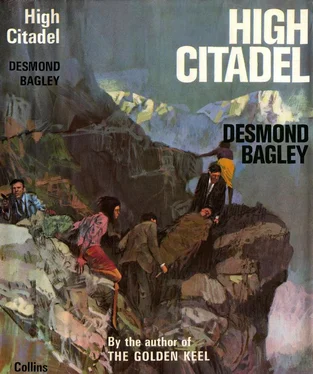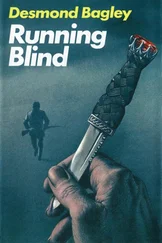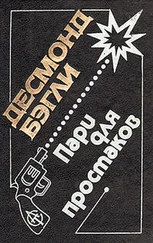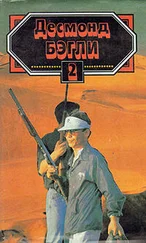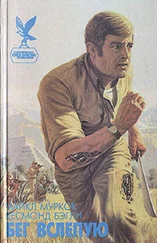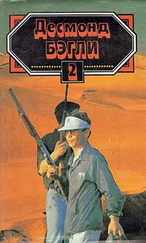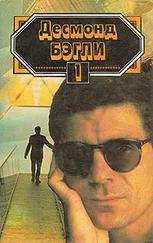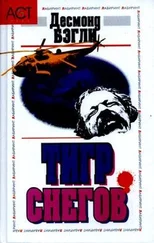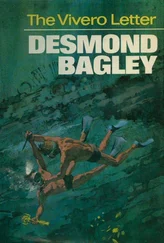Rohde came aft carrying the first-aid box which he had taken from the bulkhead. He placed it on a seat and opened it, carefully moving his fingers among the jumbled contents. He grunted. ‘Morphine.’
‘Damn,’ said Forester. ‘We could have used that on Mrs Coughlin.’
Rhode held up the shattered end of an ampoule. ‘It would have been no use; they are all broken.’
He put some bandages away in his pocket, then said, ‘This will be useful — aspirin.’ The bottle was cracked, but it still held together and contained a hundred tablets. They both took two tablets and Rohde put the bottle in his pocket. There was nothing more in the first-aid box that was usable.
Forester went into the cockpit. The body of Grivas was there, tumbled into an obscene attitude, and still with the look of deep surprise frozen into the open eyes which were gazing at the shattered instrument panel. Forester moved forward, thinking that there must be something in the wreck of an aircraft that could be salvaged, when he kicked something hard that slid down the inclined floor of the cockpit.
He looked down and saw an automatic pistol.
My God, he thought; we’d forgotten that. It was Grivas’s gun, left behind in the scramble to get out of the Dakota. It would have been of use down by the bridge, he thought, picking it up. But it was too late for that now. The metal was cold in his hand and he stood for a moment, undecided, then he slipped it into his pocket, thinking of Peabody and of what lay on the other side of the pass.
Equipment for well-dressed mountaineers, he thought sardonically; one automatic pistol.
They found nothing more that was of use in the Dakota, so they retraced their steps along the airstrip and back to the hut. Forester took the straps and a small suitcase belonging to Miss Ponsky which had been left behind. From these unlikely ingredients he contrived a serviceable pack which sat on his shoulders more comfortably than the one he had.
Rohde went to look at the mine and Peabody sat slackly in a corner of the hut watching Forester work with lacklustre eyes. He had not eaten his beans, nor had he attempted to keep the fire going. Forester, when he came into the hut, had looked at him with contempt but said nothing. He took the axe and chipped a few shavings from the baulk of wood that Rohde had brought in, and rebuilt the fire.
Rohde came in, stamping the snow from his boots. ‘I have selected a tunnel for O’Hara,’ he said. ‘If the enemy force the bridge then O’Hara must come up here; I think the camp is indefensible.’
Forester nodded, ‘I didn’t think much of it myself,’ he said, remembering how they had ‘assaulted’ the empty camp on the way down the mountain.
‘Most of the tunnels drive straight into the mountain,’ said Rohde. ‘But there is one which has a sharp bend about fifty metres from the entrance. It will give protection against rifle fire.’
‘Let’s have a look at it,’ said Forester.
Rohde led the way to the cliff face behind the huts and pointed out the tunnels. There were six of them driven into the base of the cliff. ‘That is the one,’ he said.
Forester investigated. It was a little over ten feet high and not much wider, just a hole blasted into the hard rock of the mountainside. He walked inside, finding it deepening from gloom to darkness the farther he went. He put his hands before him and found the side wall. As Rohde had said, it bent to the left sharply and, looking back, he saw that the welcome blue sky at the entrance was out of sight.
He went no farther, but turned around and walked back until he saw the bulk of Rohde outlined against the entrance. He was surprised at the relief he felt on coming out into the daylight, and said, ‘Not much of a home from home — it gives me the creeps.’
‘Perhaps that is because men have died there.’
‘Died?’
‘Too many men,’ said Rohde. ‘The government closed the mine — that was when Señor Aguillar was President.’
‘I’m surprised that Lopez didn’t try to coin some money out of it,’ commented Forester.
Rohde shrugged. ‘It would have cost a lot of money to put back into operation. It was uneconomical when it ran — just an experiment in high-altitude mining. I think it would have closed anyway.’
Forester looked around. ‘When O’Hara comes up here he’ll be in a hell of a hurry. What about building him a wall at the entrance here? We can leave a note in the hut telling him which tunnel to take.’
‘That is well thought,’ said Rohde. ‘There are many rocks about.’
‘Three will do better than two,’ said Forester. ‘I’ll roust out Peabody.’ He went back to the hut and found Peabody still in the same corner gazing blankly at the wall. ‘Come on, buster,’ Forester commanded. ‘Rise and shine; we’ve got a job of work on hand.’
Peabody’s eyelids twitched. ‘Leave me alone,’ he said thickly.
Forester stooped, grasped Peabody by the lapels and hauled him to his feet. ‘Now, listen, you crummy bastard; I told you that you’d have to take orders and that you’d have to jump to it. I’ve got a lower boiling-point than Rohde, so you’d better watch it.’
Peabody began to beat at him ineffectually and Forester shoved and slammed him against the wall. ‘I’m sick,’ gasped Peabody. ‘I can’t breathe.’
‘You can walk and you can carry rocks,’ said Forester callously. ‘Whether you breathe or not while you do it is immaterial. Personally, I’ll be goddam glad when you do stop breathing. Now, are you going to leave this hut on your own two feet or do I kick you out?’
Muttering obscenities Peabody staggered to the door. Forester followed him to the tunnel and told him to start gathering rocks and then he pitched to with a will. It was hard physical labour and he had to stop and rest frequently, but he made sure that Peabody kept at it, driving him unmercifully.
They carried the rocks to the tunnel entrance, where Rohde built a rough wall. When they had to stop because of encroaching darkness, they had built little more than a breast-work. Forester sagged to the ground and looked at it through swimming eyes. ‘It’s not much, but it will have to do.’ He beat his arms against his body. ‘God, but it’s cold.’
‘We will go back to the hut,’ said Rohde. ‘There is nothing more we can do here.’
So they went back to the hut, relit the fire and prepared a meal of canned stew. Again, Peabody would not eat, but Rohde and Forester forced themselves, choking over the succulent meat and the rich gravy. Then they turned in for the night.
Oddly enough, Forester was not very tired when he got up at dawn and his breathing was much easier. He thought — if we could spend another day here it would be much better. I could look forward to the pass with confidence. Then he rejected the thought — there was no more time.
In the dim light he saw Rohde wrapping strips of blanket puttee-fashion around his legs and silently he began to do the same. Neither of them felt like talking. Once that was done he went across to the huddle in the corner and stirred Peabody gently with his foot.
‘Lemme alone,’ mumbled Peabody indistinctly.
Forester sighed and dropped the tip of his boot into Peabody’s ribs. That did the trick. Peabody sat up cursing and Forester turned away without saying anything.
‘It seems all right,’ said Rohde from the doorway. He was staring up at the mountains.
Forester caught a note of doubt in his voice and went to join him. It was a clear crystal dawn and the peaks, caught by the rising sun, stood out brilliantly against the dark sky behind. Forester said, ‘Anything wrong?’
‘It is very clear,’ said Rohde. Again there was a shadow of doubt in his voice. ‘Perhaps too clear.’
Читать дальше
Конец ознакомительного отрывка
Купить книгу
